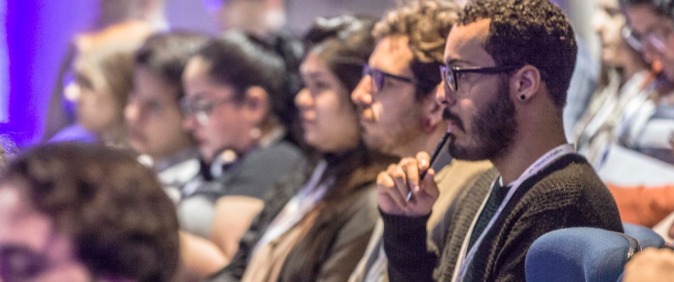- About
- Topics
- Story
- In-Depth
- Picks
- Opinion
- News
- Donate
- Signup for our newsletterOur Editors' Best Picks.Send
Read, Debate: Engage.
| February 24, 2016 | |
|---|---|
| topic: | Freedom of Expression |
| tags: | #Belarus, #hooliganism, #human rights |
| located: | Belarus |
| by: | Mikalai Anishchanka |
On January 25 Pavel Dobrovolski, a journalist for Belarus's largest news website TUT.by, was beaten up in the Frunzenski court of Minsk, together with two civil activists. Dobrovolski had come to the courthouse to report on a trial of five young men accused of hooliganism for painting graffiti supportive of Belarusian national identity, but wasn't let into courtroom.
Eventually, Dobrovolski saw two youngsters being brutally towed out of the courtroom and started filming it on his mobile phone camera. The aggrieved, who turned out to be civil activists protesting against the trial, were pushed into another room and beaten, and so was Dobrovolski, despite identifying himself as a journalist on duty.
Later that day, all three were fined 400-450 EUR each for a package of charges including contempt of court – on evidence of their offenders, who identified themselves as policemen.
Despite the opposition movement led by former political prisoner Mikalai Statkevich held a few anti-government rallies, their arrangers have just been fined other than did administrative arrest, common practice just two years ago. Suchlike penalty was also applied to civil activists who violated country's harsh laws on public gatherings and expression of opinion – to those of them whom police dared to detain.
When it comes to the attitude by Belarusian authorities to civil society, the 'repressive' periods interchange with 'liberal' ones, explains Nasta Loika of the human rights center Viasna. “The previous liberal phase we saw in 2008-2010”, she says, “and now it seems back. If a person is not burned, they can even conduct a [social] campaign without any consequences”.
Loika admits it's a huge progress compared to the preceeding crackdown on political opposition and human rights activists. After the brutal break-up of mass protest that followed the 2010 presidential elections, most of the alternative presidential candidates landed behind the bars. In 2011, the founder and chairman for Loika's Viasna NGO, Ales' Bialiatski, was sentenced to 4,5 years in prison on tax evasion charges after Belarusian authorities had obtained information about the balance of his private accounts in Lithuania that he used for accumulating financial support to his organization. He served three years despite his wife had crowdfunded and paid off the deemed damage of 71,000 EUR, and was released on parole in summer 2014.
From then on, a clear release of pressure has been seen. Ryhor Astapenia, analyst of Warsaw-based Ostrogorski Centre and editor of the Idea magazine, links this to the acute need of official Minsk for a warm-up with the West that came out of the blue amid new geopolitical realities.
“Russia that had been compensating Lukashenko's regime, could no more do so. Meanwhile, Kremlin's doings, as the developments in Ukraine showed, might pose a hazard”, he says.
As the brutal courthouse beating proved destructive for the country's new image, some conspiracy theories have emerged on social networks explaining it. The widely backed opinion is, the power ministries, not excited by the government's liberal turn, could have planned the recent beating on purpose – to show Belarus remains atrocious towards basic human freedoms. Those backing this point of view suppose that the well-fed, vast police forces would rather benefit from conserving the status quo than allow loosing the choker.
Political analyst Paulyuk Bykowski doesn't believe in a 'plot' by power ministries, because “they don't play such delicate games”. “It is more likely an excessive act when the common policemen acted as they are used to, not able to evaluate political inconvenience for official Minsk at international stage”.
In the meantime, president Lukashenka, speaking out at a Home Office meeting a couple of days after the courthouse beating, said he had “no particular claims” against the police. Bykowski links Lukashenka closing his eyes to the scandal to the current situation when the police could have treated punishment for beating the journalist and political activists as a sign of weakness, whilst president has no more resources to buy their loyalty.
As to the fate of socio-political slack in Belarus, Bykowski believes it will gradually last until international bodies make decisions crucial for Belarus: about total lift of Western sanctions towards the country, and about providing it with a few-billion EUR loan.
If these issues remain in limbo, he forecasts the 'liberal' phase will last for even longer – until the parliamentary elections due to take place in fade 2016.
By copying the embed code below, you agree to adhere to our republishing guidelines.
